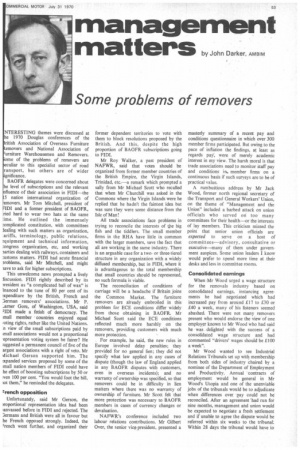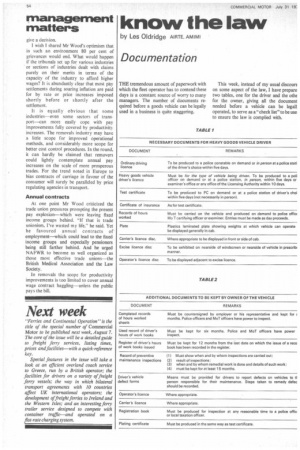management
Page 55

Page 56

If you've noticed an error in this article please click here to report it so we can fix it.
matters by John Darker. AMBIM
Some problems of removers
NTERESTING themes were discussed at he 1970 Douglas conferences of the ritish Association of Overseas Furniture emovers and National Association of urniture Warehousemen and Removers. ome of the problems of removers are eculiar to this specialist sector of road ransport, but others are of wider ignificance.
BAOFR delegates were concerned about he level of subscriptions and the relevant fluence of their association in FIDI—the 5 nation international organization of emovers. Mr Tom Mitchell, president of IDI and a former president of BAOFR, .ried hard to wear two hats at the same :ime. He outlined the immensely ;omplicated constitution, with committees leafing with such matters as organization, ariffs, terminology, public relations, :quipment and technical information, :ongress organization, etc, and working )arties dealing with railways, containers and :ustoms matters. FIDI had acute financial )roblems, said Mr Mitchell, and might lave to ask for higher subscriptions.
This unwelcome news prompted a lively liscussion. FIDI rightly described by its resident as "a complicated ball of wax" is inanced to the tune of 80 per cent of its :xpenditure by the British, French and 3erman removers' associations. Mr P. .amer Gore, of Washington, USA, said 7IDI made a fetish of democracy. The mall member countries enjoyed equal 'citing rights, rather like the United Nations. n view of the small subscriptions paid by mall associations would not a proportional epresentation voting system be fairer? He .uggested a permanent council of five of the argest associations with a right of veto. Mr vlichael Gerson supported him. The :xpanded services proposed by some of the mall nation members of FIDI could have he effect of boosting subscriptions by 50 or yen 100 per cent. "You would foot the bill, lot them," he reminded the delegates.
:rench opposition Unfortunately, said Mr Gerson, the aroportional representation idea had been :anvassed before in FIDI and rejected. The 3ermans and British were all in favour but he French opposed strongly. Indeed, the zrench went further, and organized their former dependent territories to vote with them to block resolutions proposed by the British. And this, despite the high proportion of BAOFR subscriptions going to FIDI.
Mr Roy Walker, a past president of NAFWR, said that votes should be organized from former member countries of the British Empire. the Virgin Islands, Trinidad, etc.—a remark which prompted a sally from Mr Michael Scott who recalled that when Mr Churchill was asked in the Commons where the Virgin Islands were he replied that he hadn't the faintest idea hut was sure they were some distance from the Isle of Man!
All trade associations face problems in trying to reconcile the interests of the big fish and the tiddlers. The small member firms in the RHA have little in common with the larger members, save the fact that all are working in the same industry. There is an arguable case for a twoor three-tiered structure in any organization with a widely diffused membership, but in FIDE, where it is advantageous to the total membership that small countries should be represented, no such formula is viable.
The reconciliation of conditions of carriage will be a headache if Britain joins the Common Market. The furniture removers are already embroiled in this problem for ECE conditions differ widely from those obtaining in BAOFR. Mr Michael Scott said the ECE conditions reflected much more harshly on the removers, providing customers with much more protection.
For example. he said, the new rules in Europe involved delay penalties; they provided for no general lien; they did not specify what law applied in any cases of dispute (though the law of England applied in any BAOFR disputes with customers, even in overseas incidents); and no warranty of ownership was specified, so that removers could be in difficulty in lien matters where there was no warranty of ownership of furniture. Mr Scott felt that more protection was necessary to BAOFR members in cases of currency changes or devaluation.
NAFWR's conference included two labour relations contributions. Mr Gilbert Over, the senior vice:president, presented a
masterly summary of a recent pay and conditions questionnaire in which over 300 member firms participated. But owing to the pace of inflation the findings, at least as regards pay, were of merely academic interest in my view. The harsh moral is that trade associations need to monitor staff pay and conditions in, member firms on a continuous basis if such surveys are to be of practical value.
A rumbustious address by Mr Jack Wood, former north regional secretary of the Transport and General Workers' Union, on the theme of "Management and the Union" included a barbed attack on union officials who served on too many committees for their health—or the interests of lay members. This criticism missed the point that senior union officials are
expected to serve on a host of committees—advisory, consultative or
executive—many of them under government auspices. Some union leaders I know would prefer to spend more time at their desks and less in committee rooms.
Consolidated earnings When Mr Wood urged a wage structure for the removals industry based on consolidated earnings, instancing agreements he had negotiated which had increased pay from around 17 to £30 or £40 a week, many of his listeners seemed abashed. There were not many removers present who would endorse the view of one employer known to Mr Wood who had said he was delighted with the success of a consolidated wage structure and had commented "drivers' wages should be .£100 a week".
Mr Wood wanted to see Industrial Relations Tribunals set up with membership from both sides of industry chaired by a nominee of the Department of Employment and Productivity. Annual contracts of employment would be general in Mr Wood's Utopia and one of the unenviable jobs of the tribunals would be to adjudicate when differences over pay could not be reconciled. After an agreement had run for nine months, management and union would be expected to negotiate a fresh settlement and if unable to agree the dispute would be referred within six weeks to the tribunal: Within 28 days the tribunal would have to give a decision.
I wish I shared Mr Wood's optimism that in such an environment 80 per cent of grievances would end. What would happen if the tribunals set up for various industries or sections of industries dealt with claims purely on their merits in terms of the capacity of the industry to afford higher wages? It is abundantly clear that most p4 settlements during soaring inflation are paid for by rate or price increases imposed shortly before or shortly after the settlement.
It is equally obvious that some industries—even some sectors of transport—can more easily cope with pay improvements fully covered by productivity increases. The removals industry may have a little scope for improved operational methods, and considerably more scope for better cost control procedures. In the round, it can hardly be claimed that removers could lightly contemplate annual pay increases on the scale of more prosperous trades. For the trend noted in Europe to bias contracts of carriage in favour of the consumer will surely be paralleled by price regulating agencies in transport.
Annual contracts
At one point Mr Wood criticized the trade union pressures prompting the present pay explosion—which were leaving fixed income groups behind. "If that is trade unionism, I've wasted my life," he said. Yet he favoured annual contracts of employment—which could lead to the fixed income groups and especially pensioners being still farther behind. And he urged NAFWR to become as well organized as those most effective trade unions—the British Medical Association and the Law Society.
In removals the scope for productivity improvements is too limited to cover annual wage contract haggling—unless the public pays the bill.
































































































